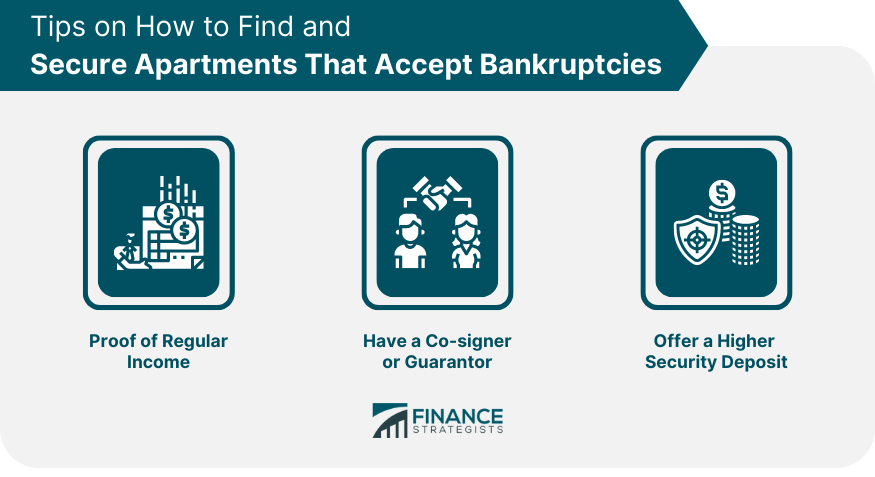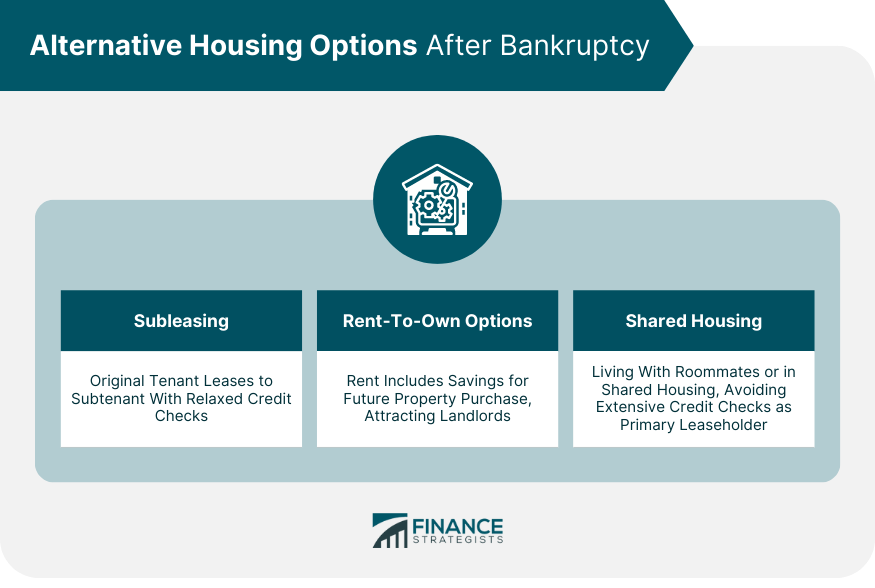Bankruptcy is a legal proceeding that offers an individual or business a chance to start fresh by forgiving debts that they cannot pay. It is typically viewed as a last resort, and the process often involves selling assets to repay creditors. The aim of bankruptcy is to give debtors a financial "clean slate", albeit at the cost of their credit reputation. Bankruptcy has a significant effect on your ability to rent an apartment. After declaring bankruptcy, finding a new place to live may become a challenge due to the negative impact on your credit history. Many landlords use credit scores to assess a potential tenant's financial responsibility, and bankruptcy can send a red flag. When you file for bankruptcy, your credit score will take a serious hit, often dropping by 200 points or more. This is a significant drop that landlords will undoubtedly notice. Many property owners rely on credit scores as an indicator of a tenant's ability to pay rent consistently and on time. Societally, bankruptcy carries a stigma of financial irresponsibility. This perspective extends to landlords and property managers, who may view bankrupt renters as high-risk tenants. There's fear that those with a bankruptcy history are more likely to default on their rent, leading landlords to reject their rental applications. A Chapter 7 bankruptcy can stay on your credit report for up to ten years from the filing date, while a Chapter 13 bankruptcy will generally remain for seven years. During this period, it may be difficult to secure rental agreements without additional measures. It's also important to differentiate between Chapter 7 and Chapter 13 bankruptcies. A Chapter 7 bankruptcy involves liquidating your assets to pay off as much debt as possible, with the remaining eligible debts being discharged. On the other hand, Chapter 13 bankruptcy involves a repayment plan to pay off all or a portion of your debts over time. The differences between these two can affect landlords' perception of your financial reliability. Local housing agencies can be a helpful resource in your search for apartments that accept bankruptcies. These agencies often have a list of housing options available to those with financial challenges, including bankruptcy. Online apartment-hunting websites are also valuable. Some websites feature filters that allow you to search for apartments that accept tenants with a bankruptcy history. These platforms offer resources like blogs and advice columns that can provide tips and insights to enhance your search. Providing proof of regular income can significantly boost your chances of securing an apartment after bankruptcy. Consistent income indicates your ability to meet the monthly rent, easing landlords' concerns. Having a co-signer or guarantor with a good credit history can also increase your chances of acceptance. This gives landlords assurance that rent will be covered, even if you face financial difficulties. Offering a higher security deposit is another method to win over potential landlords. This increased deposit serves as a risk mitigation factor for landlords, providing them a cushion should you default on rent. The Fair Housing Act offers some protections, prohibiting discrimination against renters based on various factors. However, it's essential to note that this law doesn't provide explicit protection for bankruptcy filers. The Bankruptcy Code can also provide some protection. Section 525 of the Bankruptcy Code prohibits landlords from refusing to rent to you solely because you have filed for bankruptcy. However, the same section does allow landlords to consider factors like your financial condition and history of paying rent. Honesty is the best policy when dealing with potential landlords after bankruptcy. Be upfront about your financial history and explain the circumstances that led to your bankruptcy. By demonstrating transparency and responsibility, you may garner respect and understanding from your potential landlord. Show the landlord that you've learned from your financial mistakes and have taken steps to improve your financial habits. Detail the strategies you've implemented to prevent future financial problems, such as creating and adhering to a budget, setting up an emergency fund, or seeking financial counseling. This helps reassure landlords that you're less likely to encounter problems with rent payments. If you've rented before and maintained a good rental record, be sure to highlight this. Evidence of consistent, timely rent payments and responsible behavior can go a long way toward overcoming the negative impact of bankruptcy. Subleasing is an alternative for individuals who've recently filed for bankruptcy. In a sublease, the original tenant leases the property to a subtenant. This arrangement might not require as stringent credit checks, making it easier for individuals with a bankruptcy history to secure housing. A rent-to-own arrangement is another possibility. With this agreement, a portion of your rent is set aside for the potential future purchase of the property. It can be an attractive option for landlords, as it guarantees a potential buyer for their property. Living with roommates or in shared housing can also be a good alternative. You may not be the primary leaseholder in this situation, which could allow you to avoid extensive credit checks. Making regular, timely rent payments is critical for maintaining a good rental history post-bankruptcy. Not only does this demonstrate financial responsibility, but it also helps rebuild your credit score. Having a good relationship with your landlord can lead to positive references in the future. Regular communication, prompt response to issues, and respect for the property can help foster this relationship. Taking care of the rented property as if it's your own can contribute to a positive rental history. This not only maintains the value of the property but also demonstrates your responsibility as a tenant. Rebuilding your credit after bankruptcy is crucial. A higher credit score can increase your chances of securing an apartment, reduce the cost of credit, and open up new financial opportunities. Secured credit cards are an excellent tool for rebuilding credit. They require a cash deposit that serves as your credit limit. By making regular, on-time payments, you can demonstrate financial responsibility and improve your credit score. Installment loans, such as credit-builder loans, can also help rebuild credit. As you pay off the loan over time, your credit score improves, reflecting your reliability as a borrower. Regularly monitoring your credit report can help you keep track of your progress and identify any inaccuracies that may hinder your credit-rebuilding efforts. Bankruptcy may pose hurdles in renting, but options abound. By using resources like local housing agencies or online platforms tailored for those with credit challenges, you can find suitable accommodation. Securing an apartment post-bankruptcy necessitates strategic planning. Proving regular income, having a co-signer, offering a higher deposit, honesty about your financial past, and demonstrating financial behavior changes can bolster your chances. Alternatives such as subleasing, rent-to-own, or shared housing may also be viable. Bankruptcy is not the end but a fresh start toward financial stability. Maintain good rental habits and rebuild your credit with tools like secured credit cards and installment loans. By navigating these steps effectively, you can secure suitable housing, rebuild your finances, and establish a robust financial future.Overview of Bankruptcy on Housing Options
Understanding How Bankruptcy Affects Apartment Rental Process
Impact on Credit Score
Stigma Associated With Bankruptcy and How Landlords Perceive It
How Long Does Bankruptcy Stay on Your Record?
Differentiating Between Chapter 7 and Chapter 13 Bankruptcy
Apartments That Accept Bankruptcies: Finding and Securing Accommodation
Researching Apartments That Accept Bankruptcies
Local Housing Agencies
Online Resources and Apartment Hunting Websites
Strategies to Increase Chances of Acceptance
Proof of Regular Income
Co-signer or Guarantor
Higher Security Deposit

Legal Protections for Bankruptcy Filers
The Fair Housing Act
The Bankruptcy Code
Approaching Landlords and Property Managers: Effective Communication Strategies
Being Upfront About Your Financial History
Highlighting Changes in Financial Behavior Post-bankruptcy
Showcasing Strong Rental History if Applicable
Alternative Housing Options After Bankruptcy
Subleasing
Rent-To-Own Options
Shared Housing or Roommate Situations

Maintaining Good Rental History Post-bankruptcy
Regular, Timely Rent Payments
Building a Good Relationship With Your Landlord
Proper Care and Maintenance of the Property
Rebuilding Credit After Bankruptcy
Importance of Rebuilding Credit
Practical Steps to Rebuild Credit
Secured Credit Cards
Installment Loans
Regular Monitoring of Credit Report
The Bottom Line
Apartments That Accept Bankruptcies FAQs
Bankruptcy significantly impacts your ability to secure an apartment due to the negative effect it has on your credit history. However, with strategic steps, you can find apartments that accept bankruptcies.
Bankruptcy can lower your credit score and create a stigma, making landlords view you as a high-risk tenant. However, there are strategies and resources that can help you find and secure an apartment after bankruptcy.
Providing proof of regular income, having a co-signer or guarantor, and offering a higher security deposit can increase your chances. Demonstrating improved financial habits and maintaining a good rental history also helps.
Alternative housing options include subleasing, rent-to-own arrangements, and shared housing or roommate situations.
Using tools like secured credit cards and installment loans and regularly monitoring your credit report can help rebuild your credit after bankruptcy.
True Tamplin is a published author, public speaker, CEO of UpDigital, and founder of Finance Strategists.
True is a Certified Educator in Personal Finance (CEPF®), author of The Handy Financial Ratios Guide, a member of the Society for Advancing Business Editing and Writing, contributes to his financial education site, Finance Strategists, and has spoken to various financial communities such as the CFA Institute, as well as university students like his Alma mater, Biola University, where he received a bachelor of science in business and data analytics.
To learn more about True, visit his personal website or view his author profiles on Amazon, Nasdaq and Forbes.











